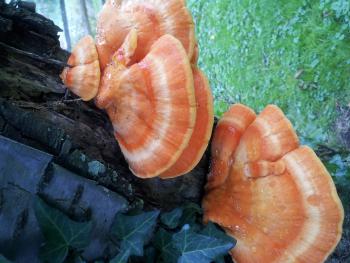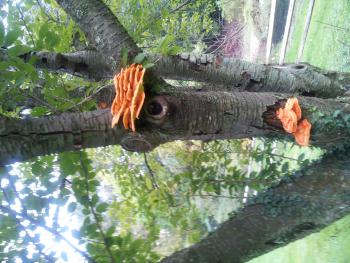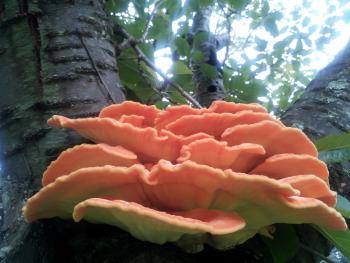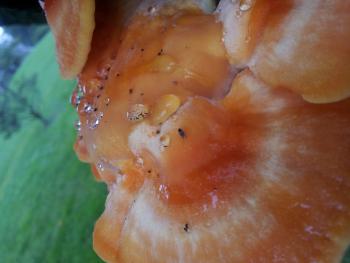Serendip is an independent site partnering with faculty at multiple colleges and universities around the world. Happy exploring!
EcoLit 313

Welcome to the on-line conversation for Ecological Imaginings, an English, Environmental Studies and Gender and Sexuality course @ Bryn Mawr College in which we are re-thinking the evolving nature of representation, with a focus on language as a link between natural and cultural ecosystems.
This is an interestingly different kind of place for writing, and may take some getting used to. The first thing to keep in mind is that it's not a site for "formal writing" or "finished thoughts." It's a place for thoughts-in-progress, for what you're thinking (whether you know it or not) on your way to what you think next. Imagine that you're just talking to some people you've met. This is a "conversation" place, a place to find out what you're thinking yourself, and what other people are thinking. The idea here is that your "thoughts in progress" can help others with their thinking, and theirs can help you with yours.
Who are you writing for? Primarily for yourself, and for others in our course. But also for the world. This is a "public" forum, so people anywhere on the web might look in. You're writing for yourself, for others in the class, AND for others you might or might not know. So, your thoughts in progress can contribute to the thoughts in progress of LOTS of people. The web is giving increasing reality to the idea that there can actually evolve a world community, and you're part of helping to bring that about. We're glad to have you along, and hope you come to both enjoy and value our shared explorations. Feel free to comment on any post below, or to POST YOUR THOUGHTS HERE.

Half the Sky
Hey everybody, I don't really know if this has any place in this Ecological Imaginings class, but maybe if we can imagine the preservation of women to be a form of ecology, not unlike the preservation of all plant life, animal life.
I just wanted to call everyone's attention to this excellent documentary currently being shown on PBS on Mon & Tues nights at 9:00 PM. I imagine you guys have lots of time to watch films, yeah! But this is an amazing series.
"Half the Sky" about gender based violence.
Here's the link to the first & second segment:
http://video.pbs.org/video/2283557115
http://video.pbs.org/video/2283558278

native...weeds..organic
Circulating in the English Department just now is an essay that just appeared in Inside Higher Education: Humanities in the Digital Age. It seemed to me to intersect quite intriguingly w/ the piece by Thomas Berry which we're reading for Tuesday, and the language is quite amazingly (ironically?) 'eco'--for instance, the claim that
"It all starts with where scholars live and work natively: in their departments…Currently, digital initiatives …spring up accidentally like weeds [well, Michael Pollan will soon have something to say to us about that conceit!] around particular faculty, areas, or projects. We propose an organic strategy for integrating digital initiatives into core departmental research, teaching, administration, and staff work…."

this invitation
...for a structured program of "storytelling integrated with mapping" caught my attention. We are not engaged, in this class, in "digital learning" on anything like this scale, but I do think our two small field trips upcoming--"back in time" to the farm from BMC was made, and then "further back in time" to understand the geological formations on which our cultural explorations sit--are akin to this project of "telling the historia of the environment":
Please see below for information on a NITLE webinar that may be of interest. I will be arranging a group viewing here on campus; please contact me if you are interested. You can also register and watch from your own computer using the link below. (Bryn Mawr College is a member of NITLE.)
*****
Stories of the Susquehanna: Digital Humanities, Spatial Thinking, and Telling the historia of the Environment

"Have Spacesuit- Will Travel"
I wrote my first web event for this course in iambic pentameter. It is pastoral, romanticizing the passing of time, the activities of nature, and my place in it. Anne questioned my use of a “very conventional poetic form.” For one I like poetry and I like that it can paint a picture without having to have me in it as an active character- I tried to make my voice more passive. It also seemed to me to be structured, like our assignment of the walk was, yet also fluid and wandering, like the walk was. Perhaps I used iambic pentameter to foreshadow our reading of Mentz on Shakespeare’s ecological tongue; or perhaps I simply did not have the words.
Having read the theories and ideas put forth by so many authors on what an ecological tongue or literary style might be, I now have some new tools with which to experiment in my imaginings of the ecological.
Let’s see what comes out when I try a retelling of my walk in a sci-fi mode…
FIRST TELLING
Where weathered rock and flowing water meet
When hot, moist air retreats at summer’s end;
Above, the vivid boughs do speak of fall
While underfoot the earth prepares for sleep.
The sparrow hops upon the iron rail
While under trees cicadas speak their death.
SCI-FI TELLING
A Wall of Dragonflies
There is a wall of dragonflies preventing me from getting to my destination. I'm letting them prevent me.
I have never seen so many dragonflies in one place and I don't like it. It is amusing how I depicted the dragonflies in beautiful jewel colors when I really don't like them at all. Below is my watercolor from my experience.


The Garden 3
It has rained and the garden is very wet. There are no crows. The only sound is a damp thickness of cricket sound, thick as an invisible soup through which my ears have to wade. As I become accustomed and tuned in to them, I hear they are not just an undifferentiated "them", but a symphonic multitude, a chorus of legions of crickets under blade and under leaf, under bush, and under tree. I will search and perhaps find none. I have searched before. Their communication ( I believe that we can make that assumption) has a comforting effect on my nervous system. Theirs is a soft blanketing sound, an unobtrusive blend with the soft swish of leaves in a soundless breeze. We hear the air’s effects. The effect of its movement on surrounding things. Everything is connected. Everything has an affect on something, or someone else.
I have heard myself claim to myself that if a garden sound is not beautiful, in the sense to which I have become accustomed by small song birds, then I would prefer it to be unobtrusive. That is to say banished.
Do I prefer unobtrusive people? Unobtrusive plants?

Site Changes



 To begin with, I was so busy emailing the photos to my email so I could upload them, that I thought my assignment was done. I didn't realize that I didn't actually post anything until after my job at the library, I apologize for being late :(
To begin with, I was so busy emailing the photos to my email so I could upload them, that I thought my assignment was done. I didn't realize that I didn't actually post anything until after my job at the library, I apologize for being late :(
Changes! So many! I dedicated today's observation to seeking out any changes occurring in the area. I could see from very far away that there was an orange growth on the tree I sit under. It was so bright orange, I thought maybe it was the foam that is put to block out and exterminate bee hives. As I got closer, I thought someone might have left a handkerchief tied on the branches. Then I saw this:

Rhoads Pond Impressionism
So I am not the best artist in the world, as evidenced by this watercolor. However, I really wanted to use the tools Nan put at my disposal. I found, though, that the brush was not the right instrument for me. I ended up using my fingers to create this. It made me feel much more connected to the paper, and was much eaasier to mix the colors I needed.
I also decided to paint ontop of a page of Gary Snyder's essay. I loved his garden metaphor for good writing, and wanted to incorporate it somehow. I tried painting on just a regular piece of paper, but decided it didn't quite caputer our class notions of language and reprsentation. I'm not quite sure how it connects, seeing as I was painting and not writing, but I like the way it turned out.
split scene
Footing. One two three four cacophanous stepping + sideways glancing. Breezes brushing momentums hurricaning whirling bumping off shoulders crossing paths. "I'm sorry." looking streetward. House on the corner is watering. Sky is watering. The house is leaving. turreted walls leaking green living, dripping growing flowering consuming. Sky greying and clearing. footsteps echoing. smell of gasolene music bumping. screeching. loudening breaking thumping. ground shaking. bass tone voices blaring. returning home -- quieting centering
tree sitting in Taft. bee crawling. black and yellow refracting -- gossamer winging. sky darkening cold invading. pen failing raindrops washing blurring dissolving paper. Sounding off leaves. Smelling of fountaining Taft. engrossing. fluffy squirrel foraging ignoring. chipmunk creeping a foot away clawing scaling the tree scurrying changing directionals startling startled dissappearing. scurrying along decaying grounding -- deadening?

The Miller Memorial Bench. Observation #3
The first few minutes of my third trip to my spot followed the basic general format that I had followed in my previous observation periods. I sat on the bench, taking into account how there were growing splotches of color in the tree leaves above the Nature Trail, noting the relative isolation of the spot being interrupted by early morning runners, noticing the mushrooms starting to grow around the bench, hearing the car horns as a traffic jam started to form on Haverford Avenue, and looking for other aspects of my location that were not the same as the previous week’s visit. But after a while of this, I kept thinking back to the alien world in Vaster Than Empires and More Slow and our class discussion about potential forms of plant sentience. By constantly thinking back to these subjects, I started considering whether my surroundings had a form of sentience and wondering if my presence at the bench was being registered by an alien mind? I began asking myself more and more questions regarding this concept such as:
- Did the leaves and pine needles lying on the ground share the same manner of sentience the trees they came from hold and lost that sentience when they fell from the trees or did they possess a separate form of sentience than the trees they come possess?

Processes - leaves and sweat, heros and songs
encounter #3: The Fear.// one huge mass of flying ants crawling over and upwards // Rambling – the urge to discover – to see what was cut away // What are we trying to create? Harnessing // giant trees in the jumble vs. giant tress on campus, surrounded only by grass
encounter #2: man-made yellow borders sprayed in/onto the ground. little flags, victory over the conquered land, staked claims to the squared off, colonized dead grass. insecticide. In the air: thousands of tiny white bugs. where are they when it’s not humid?
encounter #1: my body in the humidity – leg hairs, sweat behind my knees, gathering at the edge of my forehead, water leaving my body, why? for the sake of preserving, just like the leaves. the purpose of sweat and leaves. mud. barefoot. some of the grass slides in the mud with the pressure of my toes. I imagine that by walking – just walking – I am tearing the away roots’ fragile hold on the saturated ground.
#3 –
disturbed at the power
of trees – gargantuan – so
different in the jumble
gargantuan trees –
their power is in place, a force
contained by mowed grass
#1 –
I re-discover;
My body’s sense of leaving
as leafing. Purpose.

Injured Animal Seeks Shelter
This week, I share in Sarah's distance predicament. I always thought Rock was rather close to where I live, but apparently that distance is subjective. Last week, when I was perfectly able, the tree was not far at all. This week, with an injury, I might as well have walked to Brecon. By the time I got there, standing for too long became difficult and sitting on the tree was the worst of all. I had no hope of climbing it. I stood on the ground in the shade of the damp tree for as long as I could, but after a while I had to go back to my human den to lie down. What if I didn't have a comfortable, soft white bed to fall into? What if I, like any other species, had to live in the wild? I would choose this spot. It is shady and secluded from predators and outside influences and I would probably deal with the pain of my injury and climb the tree until I was hidden more and until I found a comfortable branch. I would have to put up with all the spiders and who knows what else that I have chosen to eliminate from my human-space room, but I would be used to them. It would be okay.
The pinecones continue to be an interesting thing to look at. I found they are especially interesting from the ground, where I have never really looked at them before. I am not yet sure if this matters in my decision to choose a new wilderness home to lie down in.


Can't focus? Take a walk
I'm a member of a Facebook group for my grade school and someone posted this link to a blog discussing "groundbreaking research on how spending time in nature affects the human brain." Just thought I would share!

The Rain
It took me three tries to get to my spot today. I sat in the Pembroke arch, watching the rain, waiting for it to let up. Every time I would think the rain had stopped, I would venture tentatively out, hand first and body second. It wasn’t raining heavily, but I had intended to draw. I was determined to find the exact moment in which the rain would pause, allowing me to carry through with my plan. I wanted to defy the rain.
Finally, after at least fifteen minutes, I realized there was no way I was going to win against the rain. I sat dejectedly on a plastic bag in my spot, feeling rather lost. What now? Is this where the narrative of “man vs nature” emerges? We make plans, but ultimately the rain is a reminder of how little can go according to that plan.

Taft Gaden - 3 - A Lesson on Letting Go
Chief Yellow Lark
"Oh Great Spirit - whose voice I hear in the winds, and whose breath gives life to all the world, hear me. I am a man before You, one of Your many children - I am small and weak. I need your strength and wisdom. Let me walk in beauty and make my eyes ever behold the red and purple sunset. Made my hands respect the things You have made, my ears sharp to hear Your voice. Make me wise, so that I may know the things you have taught my people - the lesson you have hidden in every leaf and rock."

The Secret Life of Plants?
This clip is from the 1979 documentary, The Secret Life of Plants, directed by Walton Green. I don’t know how I feel about this particular clip (his ideas get more crazy towards the end), but if there is any validity to it, it’s fascinating .
I’m having a hard time getting out of my brain. Call me self-centered, but I have always found that the best way for me to understand something is to apply it to my own experiences. It’s not that I’m not noticing things at my site today- I am. I’ve observed how the colors of the growth around me look duller in the rain. And how browns and oranges are starting to intermingle with greens. I notice the flock of birds that I’ve startled while walking to my spot. But today my mind keeps coming back to one idea.
We talked last class about the possibility that trees are sentient beings. And why not? What if plants can feel things? Can trees communicate? In the most basic chemical way, yes, many can. A forest of Aspen trees is completely connected by hundreds of miles of underground runners. Certain kinds of mushrooms are also one organism, connected underground. Do plants feel emotions like people do? Can they empathize? Do they desire things? I wonder if scientists will ever figure this out. This topic is captivating to me and I would love to learn more about it.

Unethical?

A Footprint
Here is what I focused on (sound, sight, thoughts) this damp, misty morning. "What's in a name? That which we call a rose. By any other name would smell as sweet." Writing or speaking a word too many times can make it look or sound strange- wrong. What is in a name?




